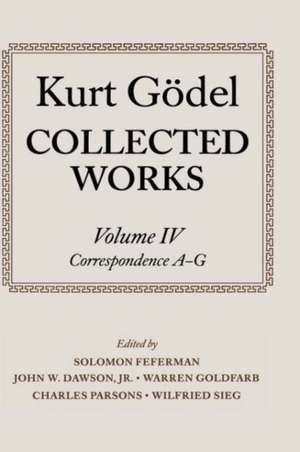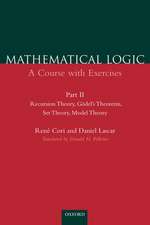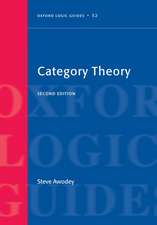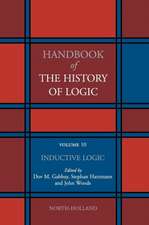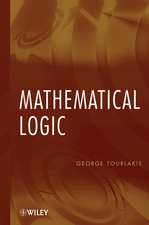Kurt Gödel: Collected Works: Volume IV: Selected Correspondence, A-G: Collected Works Series, cartea IV
Autor Kurt Gödel Editat de Solomon Feferman Autor Stanford Unviersity of Mathematics Editat de John W. Dawson, Jr., Warren Goldfarb, Charles Parsons, Wilfried Siegen Limba Engleză Hardback – 27 mar 2003
Preț: 1621.27 lei
Preț vechi: 2301.31 lei
-30% Nou
Puncte Express: 2432
Preț estimativ în valută:
310.26€ • 321.96$ • 259.33£
310.26€ • 321.96$ • 259.33£
Carte tipărită la comandă
Livrare economică 04-10 martie
Preluare comenzi: 021 569.72.76
Specificații
ISBN-13: 9780198500735
ISBN-10: 0198500734
Pagini: 684
Ilustrații: 11 half tone, 1 line
Dimensiuni: 164 x 242 x 40 mm
Greutate: 1.33 kg
Editura: OUP OXFORD
Colecția OUP Oxford
Seria Collected Works Series
Locul publicării:Oxford, United Kingdom
ISBN-10: 0198500734
Pagini: 684
Ilustrații: 11 half tone, 1 line
Dimensiuni: 164 x 242 x 40 mm
Greutate: 1.33 kg
Editura: OUP OXFORD
Colecția OUP Oxford
Seria Collected Works Series
Locul publicării:Oxford, United Kingdom
Recenzii
Review from other book by this author Gödel would probably have been pleased ... The set should be of interest to professionals and students in the area of logic, mathematics, philosophy, history of science, computer science and to some non-specialists with a background in science and/or logic. For all university level libraries and for large public and college library collections.
This book (Volume I) is unique, and every philosopher or historian of logic will be determined to possess it.
This is the second volume of this impressive series of Gödel's works ... this second volume of his published works is really fundamental, as it was only in this period that Godel decided to make public some traits of his philosophical position ... The introductory note to these writings, by R. Solovay, seems to me historically and technically superb. I congratulate the editorial team for including in this volume the improved 1972 version of the Dialectica paper of 1958 on finitary mathematics ... As a whole, the book is absolutely indispensable for anyone interested in Gödel's ideas, or generally on the history and philosophy of logic and mathematics.
These volumes contain, as well as the doctoral dissertation and a hitherto unpublished revision of a translation of the Dialectica paper, all of Gödel's work printed in his lifetime. The volumes are meticulously edited and are a pleasure to consult. Original page numbers are clearly shown; papers written in German are printed with facing translations.
Anyone interested in the life and work of Kurt Gödel, or in the history of mathematical logic in this century, is indebted to all of the contributors to this volume (volume I)for the care with which they have presented Gödel's work. They have succeeded in using their own expertise to elucidate both the nature and the significance of what Gödel and, in turn, mathematical logic have accomplished. From the example of this first volume, the edition promises to be a model of its kind; virtually nothing could be bettered.Feferman and his team are to be congratulated on the care, sureness of touch, and scholarly accuracy with which they have carried out their task
It is a fascinating and enduringly important collection, superbly well-edited, each paper being prefaced with an excellent intoduction providing background information, summaries of the arguments and, where necessary, criticisms of the views expressed. The editors are to be wholeheartedly congratulated on bringing to the public work which deserves careful study and which ought to do something to revitalise the philosophy of mathematics by presenting a point of view that, unusually, combines intellectual rigour with a willingness to make bold and metaphysical claims.
This is the third volume of a comprehensive and critical edition of the works of Kurt Gödel. . .All these essays and lectures are most carefully written and remarkably rich. They give considerable insight into Gödel's own achievements in logic, set theory and physics and also into his philosophical views. . . .This volume was a desideratum for a long time. We also hope very strongly that volume 3 is not the last volume." --
The book (Volume III) ... will certainly enlarge our appreciation of Gödel's scientific and philosophical thought as well as our understanding of his motivations.
Each item in the volume (Volume III) carries an introduction written by a leading expert, and there are detailed textual notes at the end of the book. The editorial standards are extremely high throughout
This book (Volume I) is unique, and every philosopher or historian of logic will be determined to possess it.
This is the second volume of this impressive series of Gödel's works ... this second volume of his published works is really fundamental, as it was only in this period that Godel decided to make public some traits of his philosophical position ... The introductory note to these writings, by R. Solovay, seems to me historically and technically superb. I congratulate the editorial team for including in this volume the improved 1972 version of the Dialectica paper of 1958 on finitary mathematics ... As a whole, the book is absolutely indispensable for anyone interested in Gödel's ideas, or generally on the history and philosophy of logic and mathematics.
These volumes contain, as well as the doctoral dissertation and a hitherto unpublished revision of a translation of the Dialectica paper, all of Gödel's work printed in his lifetime. The volumes are meticulously edited and are a pleasure to consult. Original page numbers are clearly shown; papers written in German are printed with facing translations.
Anyone interested in the life and work of Kurt Gödel, or in the history of mathematical logic in this century, is indebted to all of the contributors to this volume (volume I)for the care with which they have presented Gödel's work. They have succeeded in using their own expertise to elucidate both the nature and the significance of what Gödel and, in turn, mathematical logic have accomplished. From the example of this first volume, the edition promises to be a model of its kind; virtually nothing could be bettered.Feferman and his team are to be congratulated on the care, sureness of touch, and scholarly accuracy with which they have carried out their task
It is a fascinating and enduringly important collection, superbly well-edited, each paper being prefaced with an excellent intoduction providing background information, summaries of the arguments and, where necessary, criticisms of the views expressed. The editors are to be wholeheartedly congratulated on bringing to the public work which deserves careful study and which ought to do something to revitalise the philosophy of mathematics by presenting a point of view that, unusually, combines intellectual rigour with a willingness to make bold and metaphysical claims.
This is the third volume of a comprehensive and critical edition of the works of Kurt Gödel. . .All these essays and lectures are most carefully written and remarkably rich. They give considerable insight into Gödel's own achievements in logic, set theory and physics and also into his philosophical views. . . .This volume was a desideratum for a long time. We also hope very strongly that volume 3 is not the last volume." --
The book (Volume III) ... will certainly enlarge our appreciation of Gödel's scientific and philosophical thought as well as our understanding of his motivations.
Each item in the volume (Volume III) carries an introduction written by a leading expert, and there are detailed textual notes at the end of the book. The editorial standards are extremely high throughout
